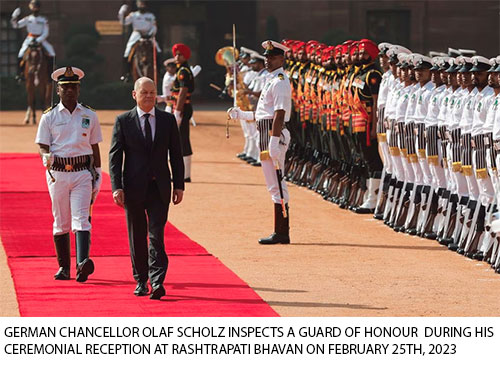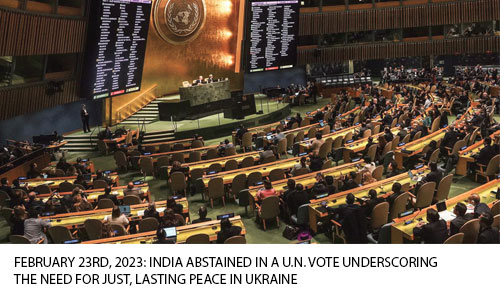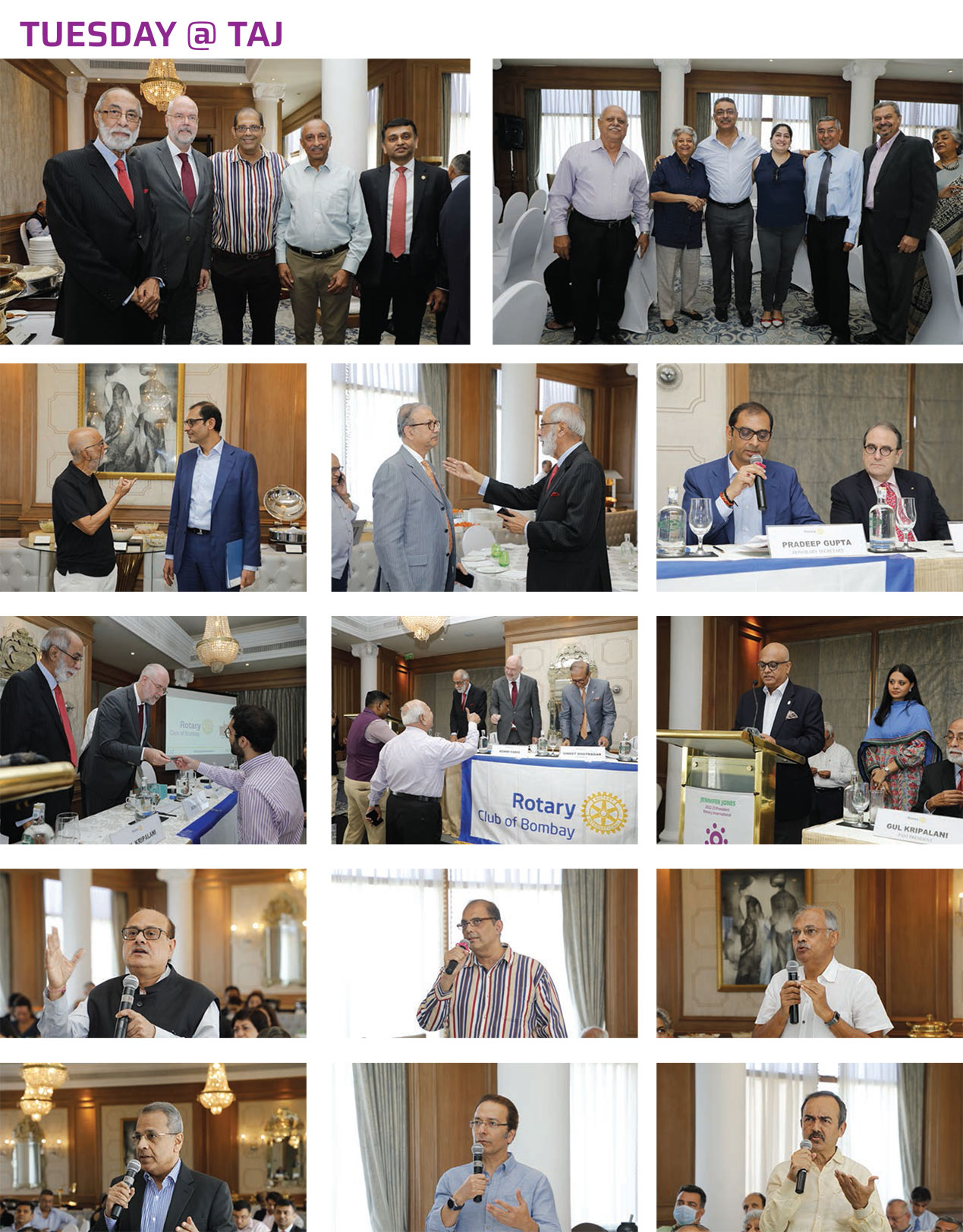
Mr. Achim Fabig, Consul General Of Germany In Mumbai, On The Future Of The Indo-German Relationship
INDO-GERMAN RELATIONS GO QUITE FAR BACK IN TIME. SOMETIMES WE FORGET THE HEYDAYS OF INDO GERMAN RELATIONS WHEN A LOT OF INDIAN STUDENTS CAME TO BERLIN AND OTHER CITIES IN GERMANY to study engineering, technology and all sorts of academics. And, also, to exchange with each other ideas of liberty and freedom, and the idea of an independent India. So, there is quite a history when more than hundred years ago, gentlemen and women from India were in Germany discussing what course the country could take.
We also have a history where we started sharing our expertise and experiences in the various fields of science. THERE’S THE FAMOUS EINSTEIN BOSE PAPER THAT DERIVED FROM A CONVERSATION BETWEEN ALBERT EINSTEIN AND SATYENDRA NATH BOSE. The latter had found it difficult at that
VELOCITY-DISTRIBUTION DATA OF A GAS OF RUBIDIUM ATOMS, CONFIRMING THE DISCOVERY OF A NEW PHASE OF MATTER, THE BOSE–
EINSTEIN CONDENSATE. LEFT: JUST BEFORE THE APPEARANCE OF A BOSE–EINSTEIN CONDENSATE. CENTRE: JUST AFTER THE APPEARANCE OF THE CONDENSATE. RIGHT: AFTER FURTHER EVAPORATION, LEAVING A SAMPLE OF NEARLY PURE CONDENSATE.
time to get attention for his papers and his work. Einstein translated him and brought the Einstein Bose deliberations to a public stage.
After the war, India was one of the first nations to recognise Germany as a nation and welcome Germany back in to
the concert of nations as well. The relationship grew but sped up only some years ago. For some time now, we have
had bi-annual consultations between the governments of India and Germany. The history of these consultations shows
that we started yet again from academia, to look at technology, science, and research and where we can work together. But we are now covering a whole field of areas where we find a common interest such as renewable energy,
sustainable development, urban development, and electric mobility.
We’re looking at green hydrogen and several other areas where the world has changed. We need to work closer together in that course. We’ve seen high rise visits from Germany to India and from India to Germany just over the
last year. We had the foreign minister twice in India. And if you look at the foreign minister before that, he was here once; and if you look at the foreign minister before that, he has never been to India.
WE HAD THE CHANCE TO COME ON A STATE VISIT JUST A FEW WEEKS AGO. WE HAVE QUITE A FEW VISITORS COMING IN THE CONTEXT OF G20, OF COURSE. BUT THERE HAVE BEEN MANY DELEGATIONS FROM PARLIAMENT. We had the budget commission here just a few weeks ago in Mumbai. We had a mission of Parliamentarians in an environmental context at the end of last year. We see that there is a growing interest in Germany to learn, understand and better see what India is thinking and where India is going.
We’ve seen that we have to reanalyse our view on alliances in this world. Who are the people we can trust? Where are the countries we can trust? What are the partners we can have? From a European perspective, another war is taking place within Europe that we find troubling and concerning. We see that China’s role is contested in many ways with the question of the intentions that China has, to possibly taking a different role vis-a-vis Taiwan, to possibly taking a different role in South Asia altogether.
We see that through the war in Ukraine that was started by Russia that there are several issues that arise in that context, be it food shortages or be it related questions. So, in that new world context, in that new world order, where some people say that the world has lost its bearings, we have to understand each other better and look for partners that we can rely on. In that sense, I find it of particular interest to see that one of the outcomes, one of the surprises, is the understanding of how do we read the war in Ukraine?

While for us in Germany it was very evidently a war of aggression to a neighbouring country with many atrocities being committed, we felt that India had a very different stand, and at first, we couldn’t understand this different stand.
It took a number of politicians and bureaucrats to understand, by coming here, starting to talk, starting to exchange and to understand that there is a long history of working with Russia, of having a partner in Russia in a number of fields. There is a dependency when it comes to defence items and arms, and there is a strategic and political friendship that has been built over many, many years. So, the basic lesson for us was that we have to learn and we have to understand what is happening, why is it happening?
WHY IS INDIA ABSTAINING IN THE FORUM OF THE UNITED NATIONS ON ISSUES LIKE THAT? WHY IS INDIA LOOKING AT A CONFLICT THAT IS IMPORTANT TO US FROM A DIFFERENT PERSPECTIVE? I think we’re taking this up in understanding that there are
issues in other parts of the world that we should be concerned with as much as we expect India to be concerned and other countries to be concerned with problems in other parts of the world as well. So, in that sense, I think we see and through the high level visitors that we have, there is an interest to exchange and to understand and the
Indian diaspora in Germany is a relatively young diaspora. I think there’s about 180,000 Indians living in Germany, about 240 Indian companies operating in Germany, and about 35,000 students of Indian origin in Germany, at this point.
The number of students is a number that we’re very proud of because we’ve seen it rise over the last couple of years. Year by year and now the number of Indian students constitutes the second largest student body from abroad in Germany. The students that are coming to Germany bring a lot of talent in areas where we feel we need talent. Germany is a society that is slowly growing old. The average age is 48 years at this point. We see that we lack a
number of people in jobs and professions where in the past years we had enough people, we now need to look for talent from abroad. So, one of the issues we will see in the next couple of years, determining the relations between India and Germany will be a question of not just highly talented professionals, highly skilled professionals, but also blue collar workers going from India to Germany.
 There is a successful project in Kerala when it comes to nurses who are being trained in the German language to go to Germany and work in German hospitals. We are looking at other areas as well. One of the most curious projects in this context is the fact that in the last year, seven butcher apprentices from Pune, from Russia, have found their way to Freiburg in southern Germany and this number is apparently rising this year. So, we’ll see people going
There is a successful project in Kerala when it comes to nurses who are being trained in the German language to go to Germany and work in German hospitals. We are looking at other areas as well. One of the most curious projects in this context is the fact that in the last year, seven butcher apprentices from Pune, from Russia, have found their way to Freiburg in southern Germany and this number is apparently rising this year. So, we’ll see people going
into very different professions and therefore constituting a different and larger community of Indians in Germany. I think in the year 2021 alone, 17,000 Indians have moved to Berlin. These numbers are growing and that has an effect on Germany as well. Now, when you walk the streets and neighbourhoods of cities, you will see a lot of Indian families. Those who had been students have found a job. Those who found a job brought their families. We’re concerned now at the consulate not just with the visa question, but also how do you get your dog to Germany?
How do you transfer your pets? So, in that sense, we see that there is a sense of family being shifted to Germany as well. And we are very happy to see that community grow. Temples are being built. There is a beautiful South Indian style temple being built in Berlin right now.
I was speaking to Zee TV some FEBRUARY 23RD, 2023: INDIA ABSTAINED IN A U.N. VOTE UNDERSCORING THE NEED FOR JUST, LASTING PEACE IN UKRAINE time ago and they’re thinking of restarting their programmes in Germany. They used to have a channel that was exclusively streaming Bollywood films in German which may have been a little bit difficult to understand if you like the original voice of Shah Rukh Khan more than what we had to offer. But this is something that underlines the growing importance and the normalisation of relations. At this point, it is important for us to see that this grows, that the understanding of each other grows. That the understanding of what people are thinking
in Germany and what they are doing in Germany grows as much as in Germany the understanding of India. Very well established departments of Indology at German universities that 100 plus years ago were already looking at the original scriptures, understanding tradition and cultures. But we need to understand more about modern India, and we need to portray, I think, a good image of modern Germany here as well.
For that, we need people well versed in both Germany and in India because we build on these bridgemakers, these people that bring their experiences of more than one culture to this enterprise. We’ll see a lot of this happening, of course, in the field of commerce, in the field of business, where we have about 1800 or so German companies operating in India. This is a number that is growing. When you speak to these companies, a lot of them are expanding.
A lot of them are doing very well. A lot of them came out of the pandemic with a positive balance sheet and many will also be found in Maharashtra, in Pune, where I think we have the mainstay of the German engineering, mechanical engineering, automation and automotive companies. WE ALSO HAVE A HUGE COMMUNITY OF GERMAN LEARNERS IN PUNE. WITH FERGUSSON COLLEGE, WE ALSO HAVE THE OLDEST FACULTY THAT HAS TAUGHT GERMAN FOR 105 YEARS NOW AND STILL GOING STRONG IN HOLDING UP THIS EXPERIENCE OF LANGUAGE AND CULTURAL EXCHANGE.
So we’re in a good place, going in the right direction, a lot of speed in this direction, a lot of music in this direction. For those of you who are on Twitter will also know that Germans can indeed dance as you may have seen the Ambassador’s video that was just put out some time ago. And I think he means it in a sense that if you see that clip that there is a growing understanding of what is India. It’s not just making some moves, but it’s an appreciation of the culture, of the sounds of the sides and of everything that makes India. I think with this understanding, with an Ambassador at the helm, we are really on a good path to intensify, work closer together and look at the challenges that we really need to look at. Some of the challenges we see today: what’s the environment
going to be, where are we going on that? So, we’re working on projects on transmission of renewable energy. We’re trying to work closer together on green hydrogen. We also have a lot of interest urban development, electric mobility, and these areas. So, there’s a vast field that is growing constantly. It has left the early years of science and academia and stretching into all sorts of society, all sorts of strata of what is important to us now. In a political geopolitical context, we see common values and common interest and we can work together on this. For
instance, the G4 want to reform the Security Council at the United Nations and also other fora.

